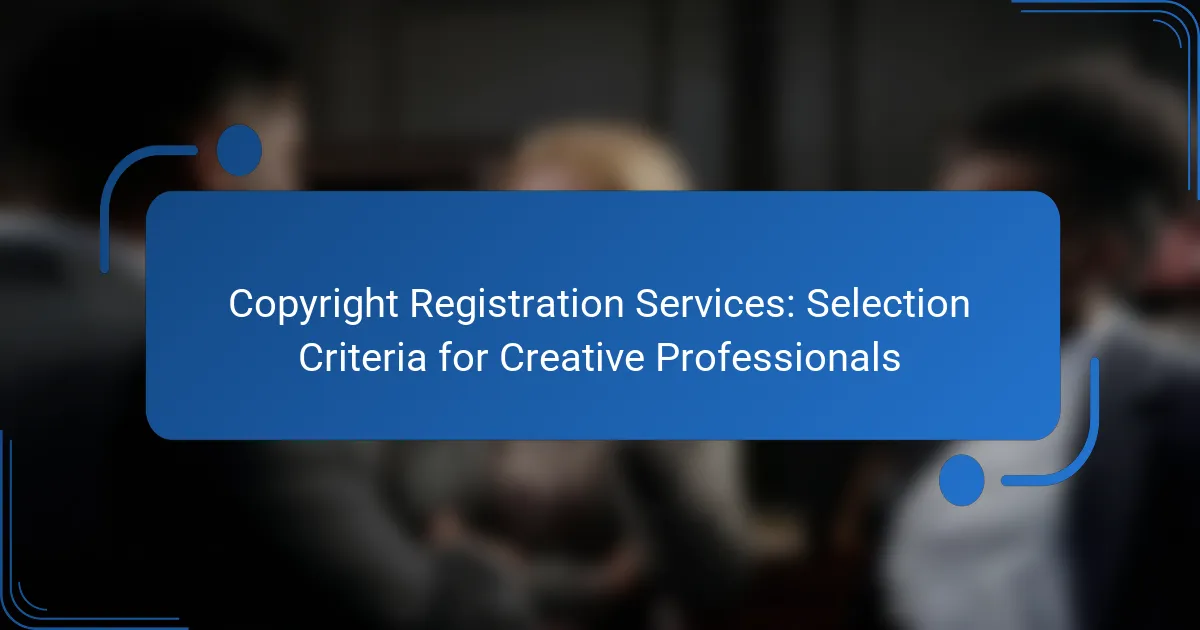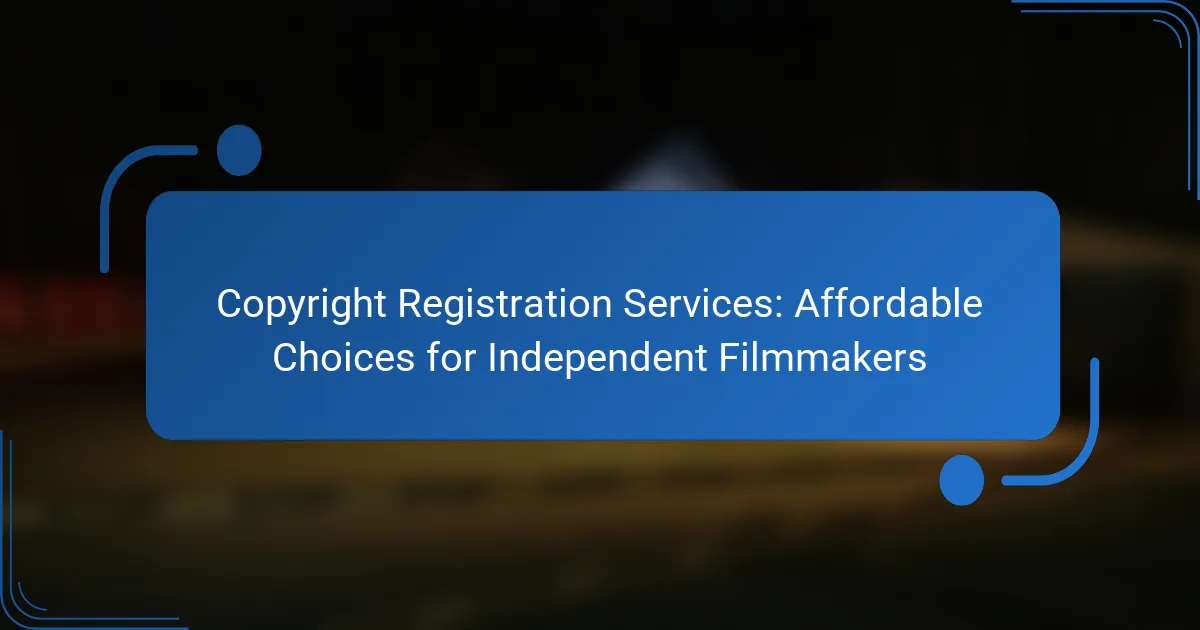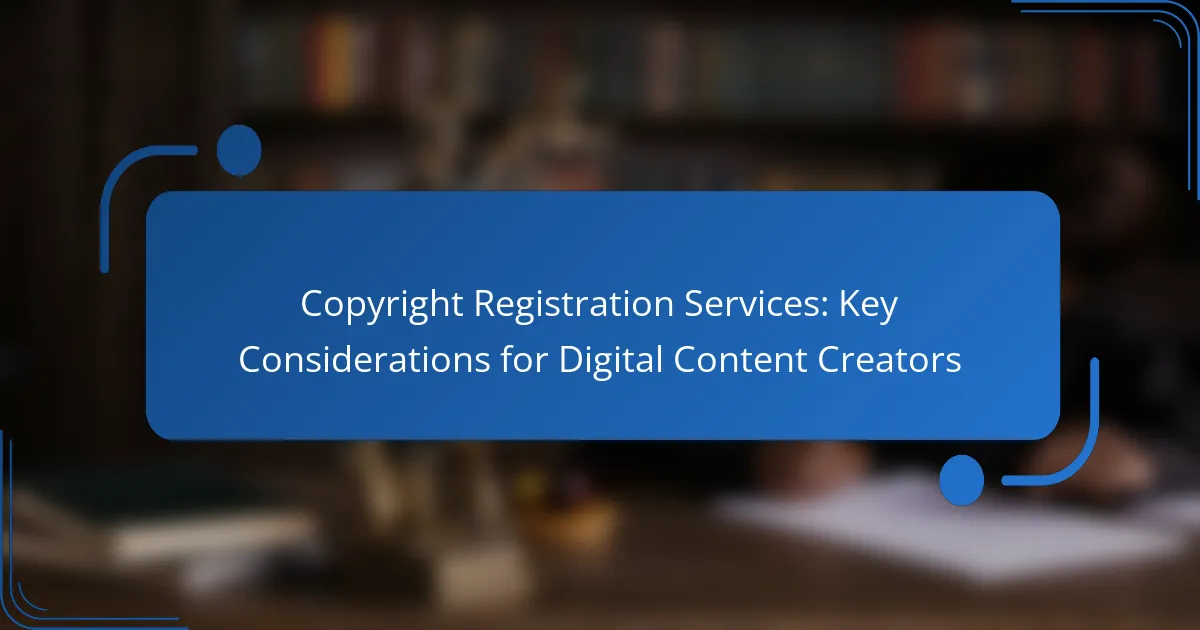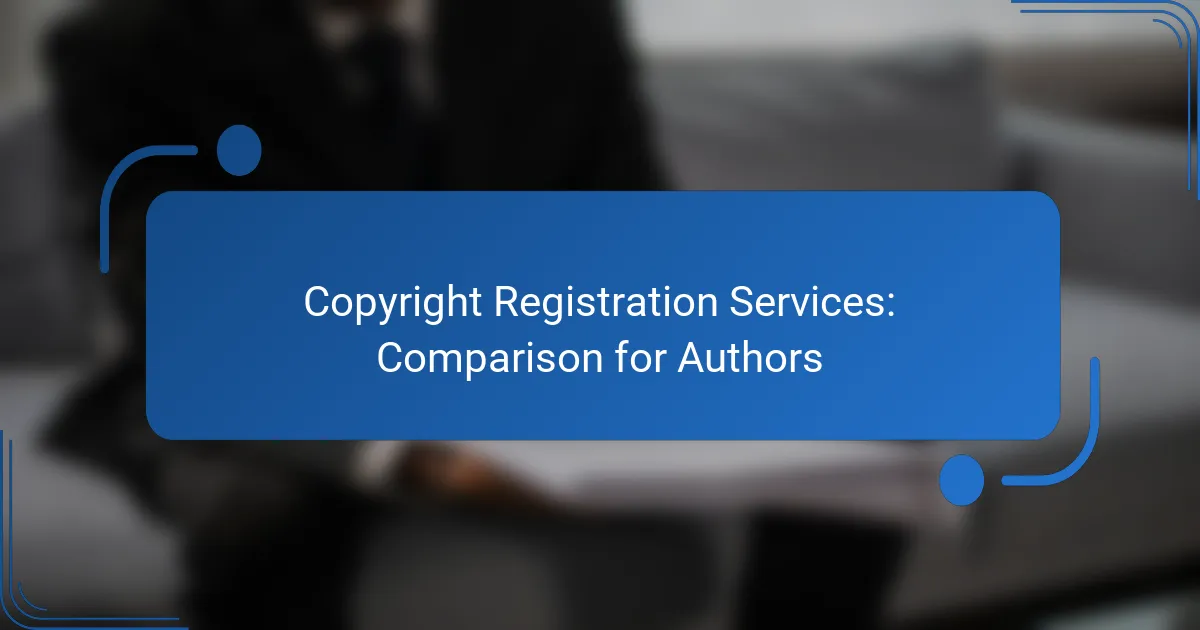When selecting copyright registration services, creative professionals should prioritize affordability, ease of use, and comprehensive support to protect their intellectual property effectively. Assessing features, pricing, and customer feedback is essential to find a service that meets your specific needs and ensures a smooth registration process. Look for options that offer transparent pricing and positive user reviews to enhance your overall experience.
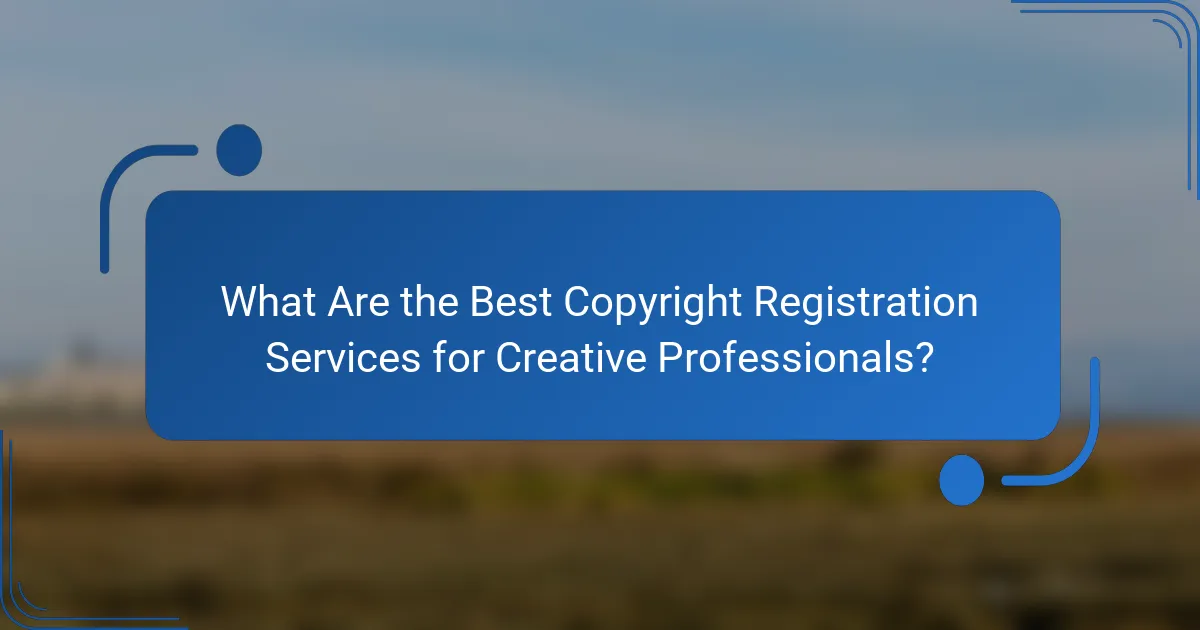
What Are the Best Copyright Registration Services for Creative Professionals?
The best copyright registration services for creative professionals offer a balance of affordability, ease of use, and comprehensive support. These services help protect intellectual property by simplifying the registration process and ensuring compliance with legal requirements.
LegalZoom Copyright Registration
LegalZoom is a popular choice for copyright registration due to its user-friendly interface and extensive support resources. The service typically costs around $150 to $200, which includes filing fees and assistance with the application process.
One key benefit of LegalZoom is its customer service, which provides guidance throughout the registration process. However, users should be aware that while LegalZoom simplifies the application, it does not guarantee expedited processing times, which can vary.
Copyright Office Online Registration
The U.S. Copyright Office offers an online registration system that allows individuals to file their copyright applications directly. This service is generally the most cost-effective option, with fees ranging from $45 to $65 depending on the type of work being registered.
Using the Copyright Office’s online system can lead to faster processing times compared to paper applications. However, applicants must be comfortable navigating the official website and understanding the specific requirements for their work type.
WIPO Copyright Registration
The World Intellectual Property Organization (WIPO) provides an international copyright registration service that is ideal for creators seeking global protection. WIPO’s fees vary based on the type of registration and the countries involved, often starting around several hundred Swiss Francs.
WIPO’s service is particularly beneficial for professionals who wish to secure copyright in multiple countries simultaneously. However, it is important to note that WIPO registration does not replace national copyright laws, so additional local registrations may still be necessary.
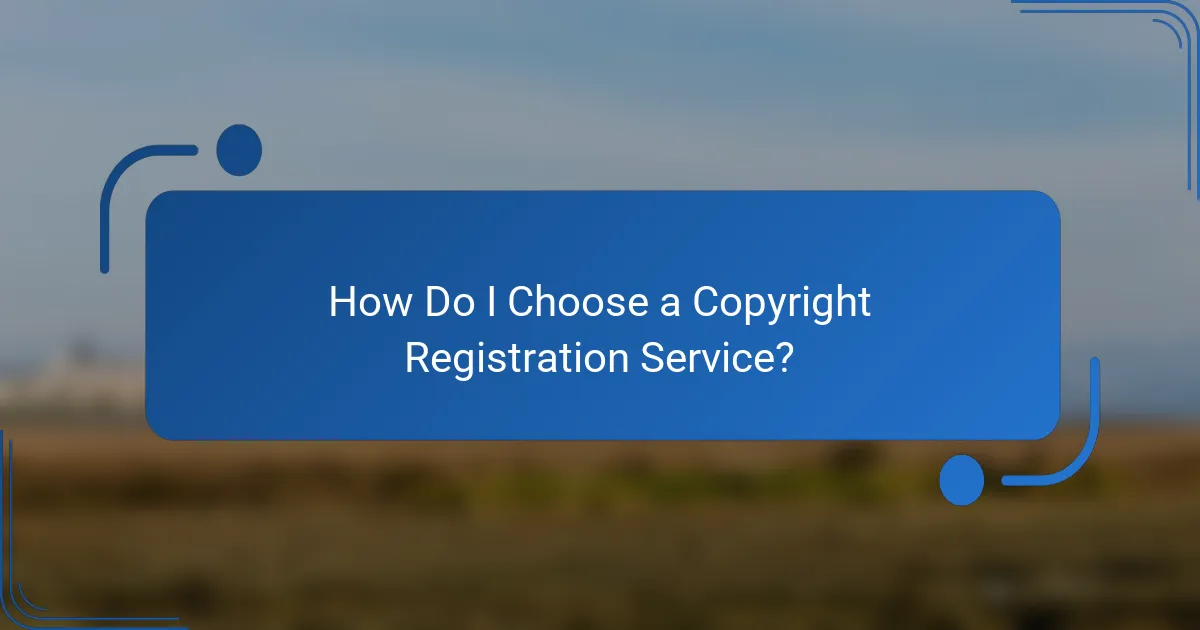
How Do I Choose a Copyright Registration Service?
Choosing a copyright registration service involves assessing features, pricing, and customer feedback to ensure you select the best option for your creative work. Focus on services that meet your specific needs, offer transparent pricing, and have positive reviews from other users.
Evaluate Service Features
When evaluating copyright registration services, consider the features they offer. Look for services that provide comprehensive support, such as online registration, tracking, and legal assistance. Some platforms may also offer additional resources like templates or educational materials to help you understand the registration process.
Check if the service includes features like expedited processing or international registration options, which can be crucial if you plan to protect your work in multiple countries. A user-friendly interface and responsive customer support are also essential aspects to consider.
Compare Pricing Models
Pricing for copyright registration services can vary significantly, so it’s important to compare different models. Some services charge a flat fee for registration, while others may have tiered pricing based on the complexity of your work or additional features included.
Typical costs can range from around $35 to several hundred dollars, depending on the service and the level of support provided. Be sure to factor in any hidden fees, such as those for expedited service or additional documentation, to get a clear picture of the total cost.
Check Customer Reviews
Customer reviews provide valuable insights into the reliability and effectiveness of copyright registration services. Look for feedback on platforms like Trustpilot or Google Reviews to gauge user satisfaction and identify any common issues.
Pay attention to comments regarding the ease of the registration process, the quality of customer service, and the overall experience. A service with consistently high ratings and positive testimonials is likely to be a safer choice for your copyright needs.
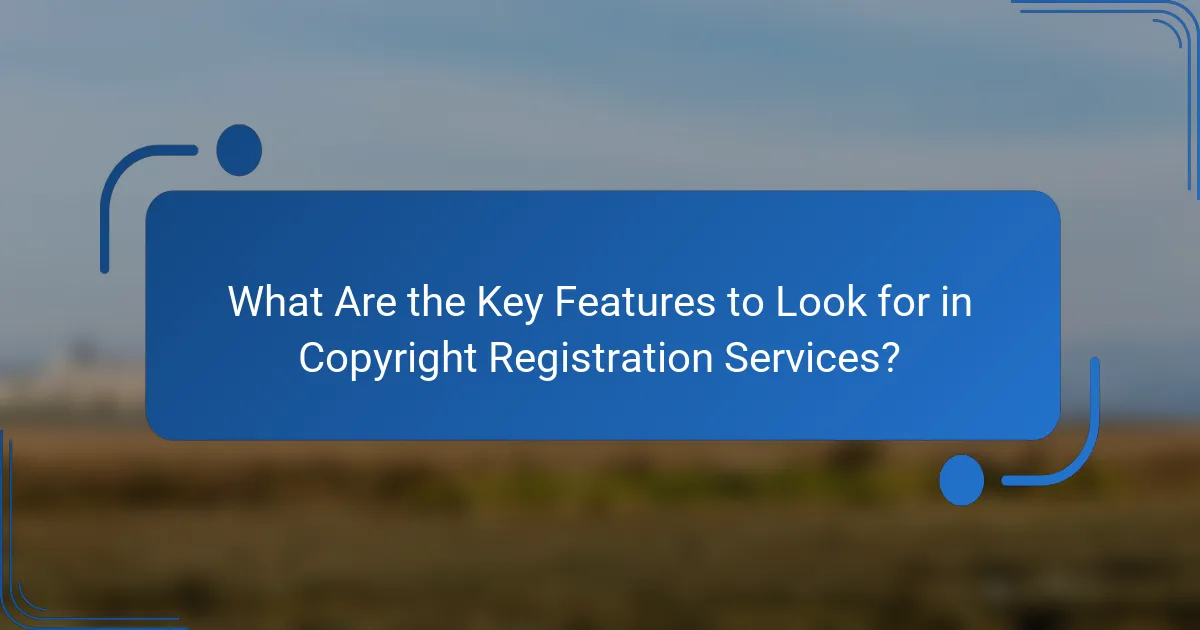
What Are the Key Features to Look for in Copyright Registration Services?
When selecting copyright registration services, focus on features that enhance usability, support, and efficiency. Key aspects include ease of use, customer support options, and processing time, which can significantly impact your experience and satisfaction.
Ease of Use
Copyright registration services should offer a straightforward and intuitive interface. Look for platforms that provide clear navigation and step-by-step guidance throughout the registration process. A user-friendly design can save you time and reduce frustration.
Consider services that allow for online submissions and provide templates or examples to help you fill out forms correctly. This can streamline the process and minimize errors, ensuring your application is processed without unnecessary delays.
Customer Support Options
Reliable customer support is crucial when dealing with copyright registration. Check if the service offers multiple support channels, such as phone, email, and live chat, to assist you with any questions or issues that may arise.
Additionally, evaluate the availability of support. Services that provide extended hours or 24/7 assistance can be particularly beneficial, especially if you encounter problems outside of regular business hours.
Processing Time
Processing time can vary significantly between copyright registration services. Some may offer expedited options for an additional fee, allowing for faster registration. Understanding the typical timelines can help you plan accordingly, especially if you need protection for your work urgently.
As a general guideline, standard processing may take several weeks, while expedited services could reduce this to a matter of days. Always inquire about the expected timeframe before making a decision, as this can impact your project’s timeline.
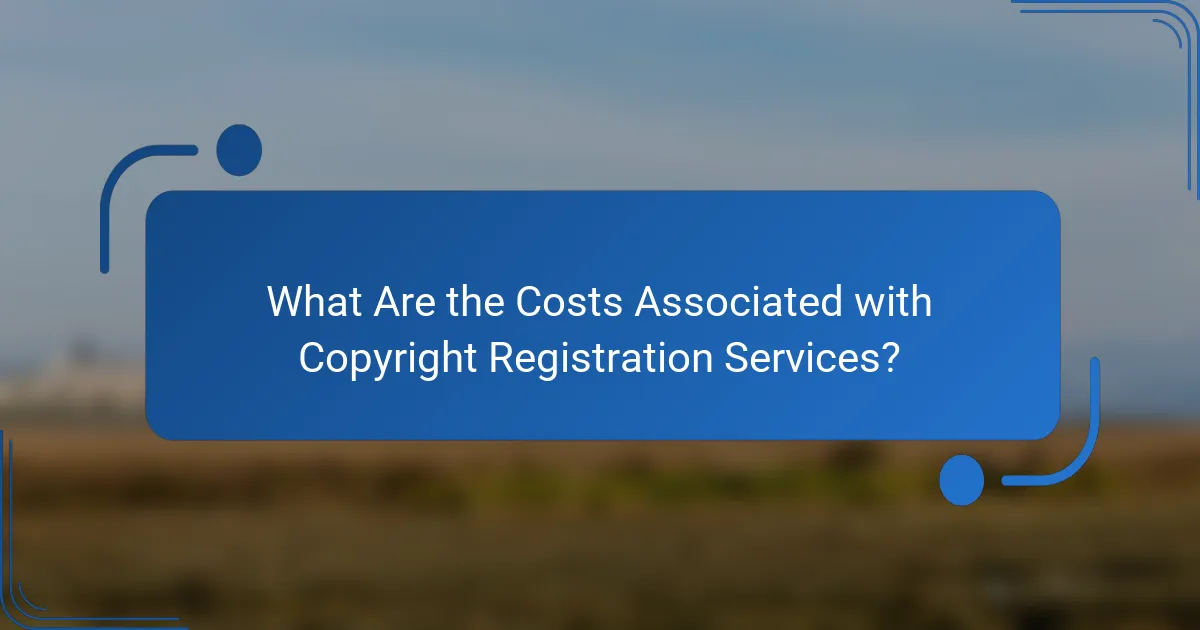
What Are the Costs Associated with Copyright Registration Services?
The costs of copyright registration services can vary significantly based on the provider and the complexity of the work being registered. Generally, you can expect to pay a combination of service fees and additional costs that may arise during the registration process.
Service Fees Overview
Service fees for copyright registration typically range from around $50 to $150, depending on the service provider and the type of work being registered. Some companies may offer package deals that include additional services, such as legal advice or expedited processing, which can affect the overall cost.
When selecting a service, compare the fees of different providers and consider what is included in the price. For example, some may charge extra for online submissions, while others may include them in their base fee.
Additional Costs to Consider
In addition to service fees, there may be other costs associated with copyright registration. These can include government filing fees, which typically range from $35 to $85 in the United States, depending on the type of application submitted.
Other potential expenses include costs for legal consultations, if you choose to seek professional advice, and fees for any necessary revisions or resubmissions. It’s advisable to budget for these additional costs to avoid surprises during the registration process.
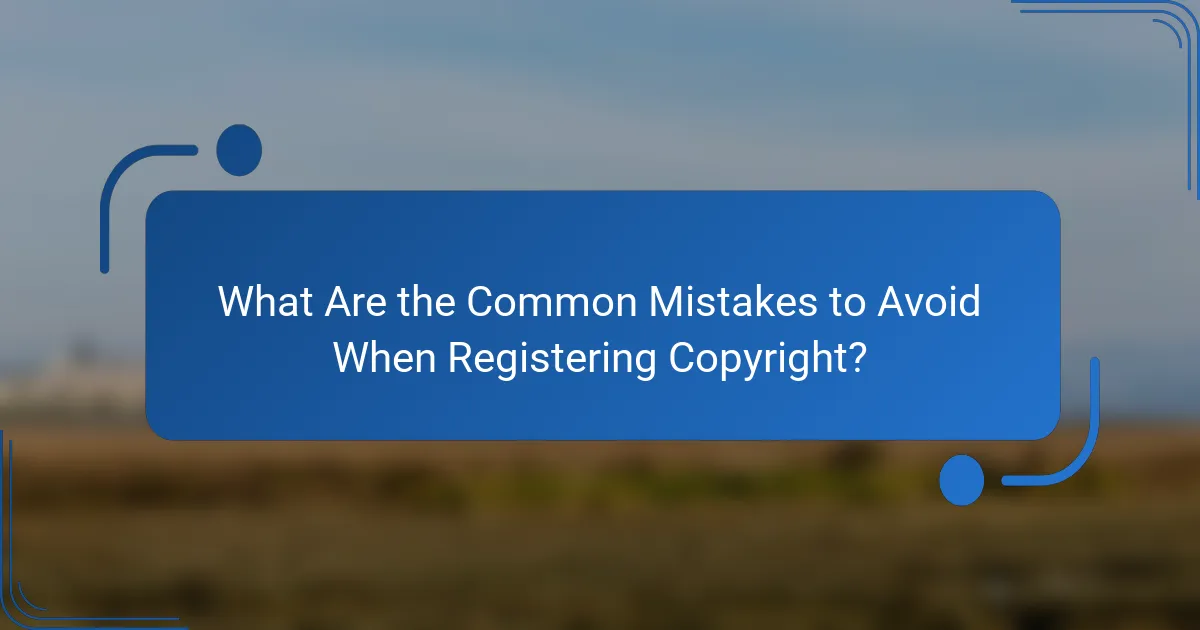
What Are the Common Mistakes to Avoid When Registering Copyright?
Common mistakes in copyright registration can lead to delays or rejections. Understanding these pitfalls can help ensure a smoother process and protect your creative work effectively.
Incorrect Application Information
Providing incorrect application information is a frequent error that can result in the denial of your copyright claim. Ensure that all details, such as your name, address, and the title of your work, are accurate and match the documentation you submit.
Double-check your application for typos or inconsistencies. For instance, if your work is a collaborative effort, clearly list all contributors to avoid confusion. Missing or incorrect details can lead to complications in ownership rights later on.
Missing Deadlines
Missing deadlines is another common mistake that can jeopardize your copyright registration. Each country has specific time frames for submitting applications, and failing to adhere to these can result in losing your rights.
To avoid this, keep a calendar with important dates related to your registration process. For example, in the United States, you should file your application within three months of publication to qualify for certain benefits. Setting reminders can help ensure you stay on track.
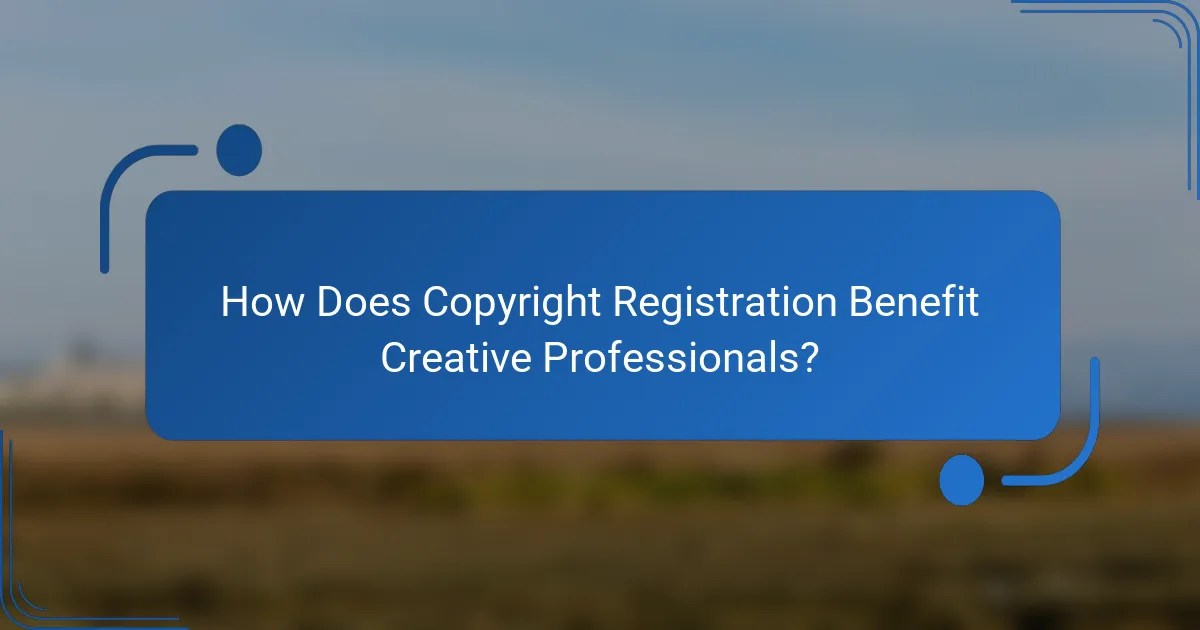
How Does Copyright Registration Benefit Creative Professionals?
Copyright registration provides essential legal recognition and protection for creative professionals, safeguarding their original works from unauthorized use. By formally registering their creations, artists and creators can enhance their ability to enforce their rights and claim damages in case of infringement.
Legal Protection of Work
Registering a copyright grants creators legal protection, making it easier to prove ownership in disputes. This registration serves as a public record, which can deter potential infringers from using the work without permission. In many jurisdictions, such as the United States, registration is a prerequisite for filing a lawsuit for infringement.
Additionally, registered works are eligible for statutory damages and attorney’s fees in litigation, which can significantly increase the financial recovery in case of a violation. This legal backing provides a strong incentive for creative professionals to pursue registration promptly.
Increased Credibility
Having a registered copyright enhances a creator’s credibility in their field, signaling professionalism and commitment to protecting their work. This can be particularly beneficial when seeking partnerships, funding, or clients, as it demonstrates a serious approach to intellectual property.
Moreover, registered copyrights can be a valuable asset in negotiations, allowing creators to leverage their rights for licensing opportunities or collaborations. By showcasing their registered works, creative professionals can build trust and establish a stronger reputation in the competitive marketplace.
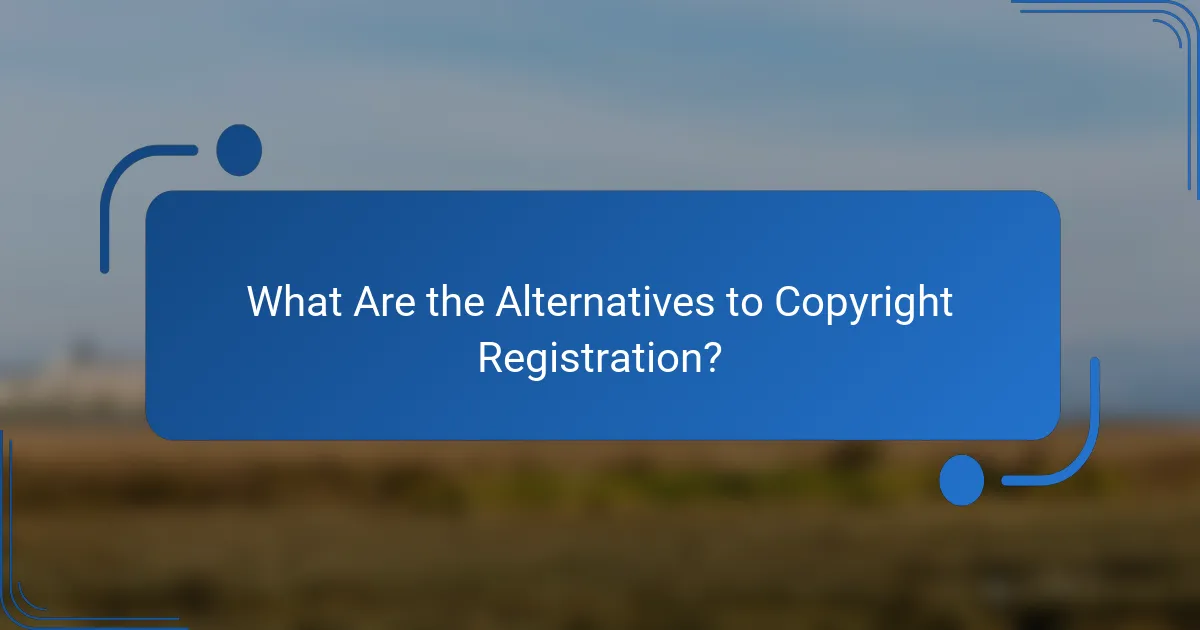
What Are the Alternatives to Copyright Registration?
Alternatives to copyright registration include common law copyright, creative commons licenses, and various forms of informal protection. Each option offers different levels of legal protection and may suit different needs for creative professionals.
Common Law Copyright
Common law copyright automatically protects original works as soon as they are created and fixed in a tangible form. This means that as soon as you write a song or paint a picture, you have some level of copyright protection without needing to register it. However, proving ownership can be challenging without formal registration.
In the United States, for example, common law copyright can provide basic protection, but it may not be as robust as registered copyright. If a dispute arises, you may need to present evidence of creation, such as drafts or dated files, to establish your claim.
Creative Commons Licenses
Creative Commons licenses allow creators to specify how others can use their works while retaining some rights. These licenses range from very permissive, allowing for commercial use and modifications, to more restrictive, limiting use to non-commercial purposes only.
Using a Creative Commons license can help clarify your intentions regarding your work and encourage sharing while protecting your rights. It’s essential to choose the right license that aligns with your goals for distribution and use.
Informal Protection Methods
Informal protection methods include keeping detailed records of your work and sharing it with trusted individuals or platforms. This can help establish a timeline and provide evidence of your authorship if disputes arise.
Additionally, using watermarks or digital rights management (DRM) can deter unauthorized use of your work. While these methods do not provide legal protection, they can serve as deterrents against infringement.
